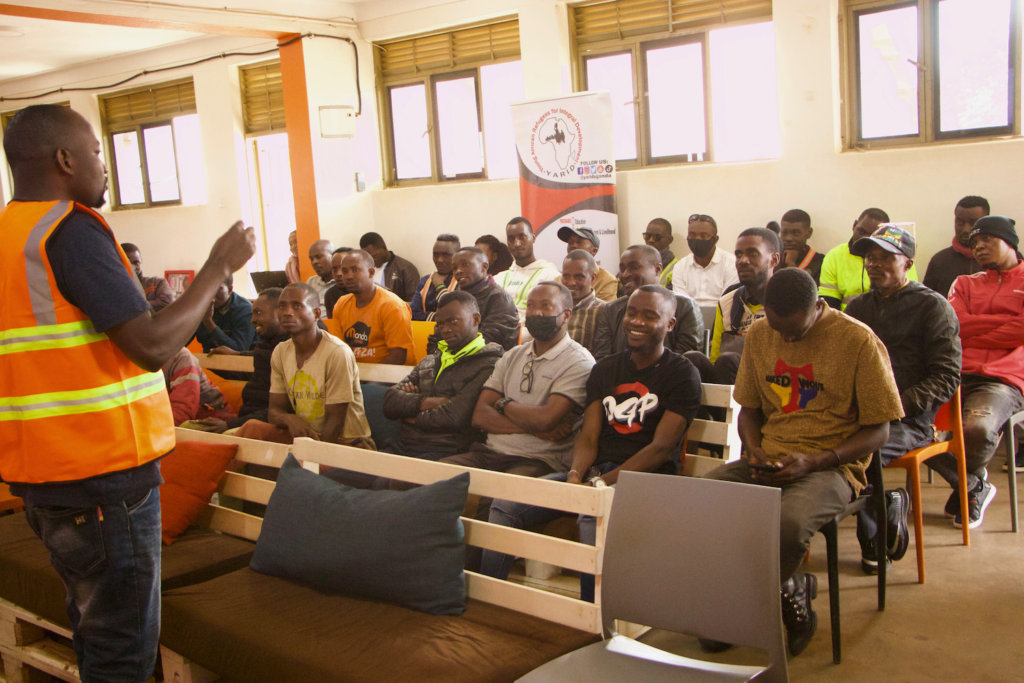By Michelle Hassan

For refugees, the right to work is essential for building resilience and securing dignity. However, many obstacles hinder the integration of refugees into the workforce in host countries, such as identity issues, the legal right to work, the local labor market structure, language disparities, and social networks, among many others.
Jobtech platforms, digital platforms that connect individuals to work opportunities, have the potential to address the employment challenge. These platforms (e.g. ride-hailing apps, food delivery apps, online job sites, and more) offer diverse work opportunities from gig work to full-time work, accommodating various skills and competencies, thus enabling a better matched and more inclusive labor market. However, building well-functioning labor markets that effectively match labour demand and supply systematically requires time and significant resources.
Uganda hosts over 1.5 million refugees, mainly from South Sudan and the Democratic Republic of Congo, with 41% being adults, making it one of the most progressive countries regarding refugee policies by allowing refugees to work and have free movement. In 2023, the Jobtech Alliance, explored the labour supply-and-demand issues in Uganda. A key insight from our research highlighted a substantial challenge: identifying and connecting with qualified refugee candidates proved to be a serious obstacle—one that jobtech platforms were inadequately equipped to address.
Platforms willing to engage refugees have to figure out where to find them and how to gain their trust. They also have to address issues related to language barriers and digital literacy, as jobtech platforms typically require a certain level of digital proficiency. Refugee Led Organizations (RLOs) can play a crucial role in addressing these challenges. They understand their communities, responding to needs and priorities, effectively targeting and connecting with skilled unemployed or under-employed refugee workers. Based on our research in Uganda, member-based organizations like RLOs facilitate the integration of refugees into host communities, making them invaluable intermediaries. They identify and prepare labor supply (refugees) and give them the best possible chance to be matched with jobs (demand side). They lower barriers to job market entry by helping refugees get the necessary identity verification. They partner with platforms and alliances like the Jobtech Alliance to enable refugees to find meaningful work and more.
Refugees present a unique business opportunity for jobtech platforms. They bring a wealth of skills and experience when they flee to new countries. By catering to refugees, platforms can tap into a continually growing market as displacement persists. The global refugee population is substantial, providing a large pool of potential users for jobtech platforms. Additionally, refugees often possess language skills and cultural understanding that can be valuable in reaching diverse markets. Jobtech platforms can benefit from this diversity in creating a more inclusive and globally aware user experience.
At the Jobtech Alliance, we’re collaborating with two exceptional RLOs, AYAN and YARID, to identify and onboard refugee talent onto jobtech platforms in our portfolio. Through this collaboration, we have successfully identified qualified refugees who have been recruited on various platforms, including Wowzi, a monetization platform for influencers and creatives, Jumia J-force, a sales agent model, and Safeboda, a ride-hailing app. The RLOs helped facilitate the identification and onboarding of these qualified individuals. Serving as matchmakers, they identified refugees based on the criteria provided by the platforms.
RLOs play a crucial role in closing these gaps by providing ongoing training and assisting refugees in navigating challenges through both in-person and WhatsApp support. Throughout this process, RLOs have gained insights into the essential requirements for refugees to successfully onboard and thrive on these platforms. In the case of Wowzi, RLOs, with the support of the Wowzi team, guided refugees through training sessions and helped them set up social media accounts. Ongoing support is being provided to ensure they can successfully create their first few targeted social media posts successfully.
However, there are concerns regarding the model. While RLOs excel in the supply aspect, they are constrained in their ability by the demand or performance of the platform. We have seen in our work instances where platforms such as Wowzi and Jumia failed to provide sufficient work, refugees lost interest and churned, despite the good intentions of RLOs. The key takeaway is that even with a platform’s intent to be inclusive, it remains an illusion if the demand challenge is not adequately addressed.
Another concern relates to sustainability. The viability of RLO training is contingent on securing funding. Through the Jobtech for Refugees project, we are collaborating with platforms to implement changes, which include developing playbooks that RLOs can incorporate into their training initiatives. As Jobtech platforms continue to work with RLOs, they have to be mindful that refugees may require additional support.
As the sector evolves, ecosystem players need to make key considerations, including:
- Increasing the engagement between jobtech platforms and RLOs. These platforms can utilize the expertise of RLOs to reach and train refugee talent more effectively. Thus, integrating them well into the job-market and helping them become productive.
- Focusing on skill development to match job opportunities in the local market through tailored training programs for specific job requirements and refugee needs.
- Recognizing the importance of high-touch human interventions in the tech-driven job market. Tech platforms are usually low-touch. Their one-size-fits-all model of scale inadvertently leaves refugees out of their job opportunity set. RLOs are plugging this gap by designing programs that increase the probability of success for refugees in this emerging job market. As the world accelerates towards tech-powered job platforms that are standardized and impersonal, RLOs in refugee communities are helping displaced people gain the dignity of work through high-touch human interventions designed with compassion.
- Continuing to use engagements connecting refugees to jobtech platforms to demonstrate the business case of investing in refugees (in terms of capacity to find talent, reach new markets, or grow sales). Platforms will continue to engage refugees as long as it makes business sense for them to do so.

0 Comments